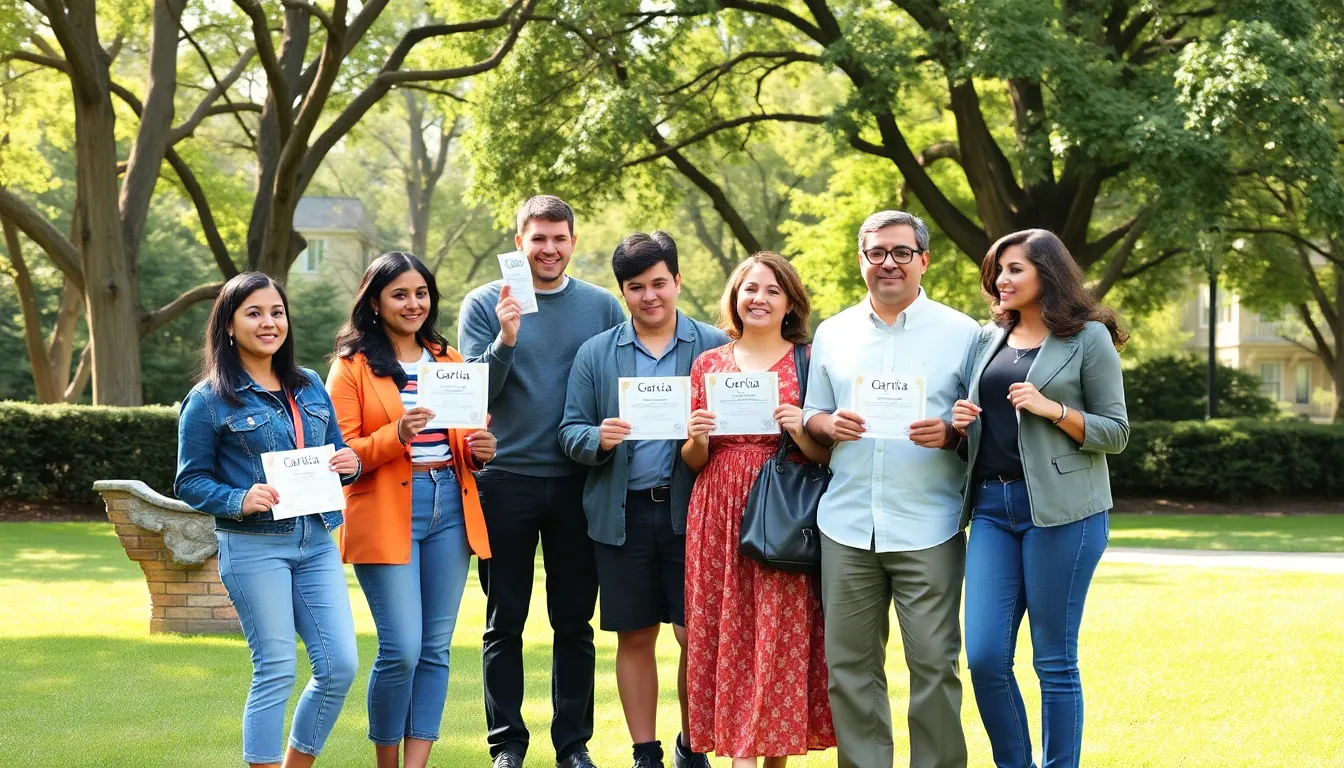In a world where names can spark curiosity, “Garcia” stands out like a piñata at a birthday bash. With its rich Hispanic heritage and widespread popularity, one might wonder: is Garcia a US citizen? The answer isn’t just a simple yes or no; it’s a journey through the complexities of citizenship, identity, and the American dream.
Table of Contents
ToggleUnderstanding US Citizenship
US citizenship signifies a legal bond between an individual and the United States, conferring rights and responsibilities. It’s essential for determining an individual’s status, particularly for those with the surname “Garcia.”
Definition of Citizenship
Citizenship refers to the status of being a recognized member of a nation. It typically involves specific legal rights such as voting and obtaining a passport. In the US, individuals gain citizenship mainly through birth, naturalization, or parents’ citizenship status. Recognition entails not only legal privileges but also the obligation to follow the laws of the country. Documentation plays a crucial role in establishing citizenship, including birth certificates and naturalization certificates.
Types of Citizenship
Citizenship in the US can be divided into two primary types: birthright and naturalized. Birthright citizenship applies to individuals born on US soil, including territories. Naturalized citizenship involves a process for foreign nationals to gain citizenship after fulfilling requirements, such as residency and language proficiency. Each type grants the same legal rights, but pathways differ significantly. Multiple individuals with the surname “Garcia” might belong to one of these classifications based on their circumstances.
The Case of Garcia

The case of individuals with the surname Garcia centers on citizenship status. Various factors—such as place of birth and parental citizenship—play crucial roles.
Background Information
Garcia is a common surname among Hispanic communities in the United States. Over 1.5 million individuals in the U.S. bear the name, reflecting its cultural significance. Those with the surname may hold U.S. citizenship in different ways. Birthright citizenship applies to anyone born on U.S. soil, while naturalization processes offer a pathway for foreign nationals. Understanding these distinctions clarifies the citizenship landscape for Garcias. Legal documentation plays a vital role when verifying citizenship status. Confirming eligibility for rights and responsibilities hinges on this documentation.
Citizenship Claims
Citizenship claims among those named Garcia often arise from diverse backgrounds. Birth certificates serve as primary evidence for those born in the U.S., affirming their status as citizens. Some claim citizenship through American parents, even if born abroad. The naturalization process becomes relevant for many immigrants seeking U.S. citizenship. Application procedures require personal information, including employment history and residency details. Interviews and examinations assess knowledge of U.S. history and government as part of this process. Claims for citizenship can differ based on individual circumstances, highlighting the varied experiences of Garcias across the nation.
Legal Framework
Understanding the legal framework surrounding U.S. citizenship is essential for individuals with the surname Garcia. It encompasses laws and regulations that determine citizenship eligibility.
Immigration Law Overview
Immigration law shapes how individuals can acquire U.S. citizenship. Several statutes guide citizenship acquisition, with the Immigration and Nationality Act (INA) serving as a foundational law. This act outlines criteria for naturalization and identifies categories of immigrants eligible for citizenship. Birthright citizenship applies automatically to individuals born on U.S. soil, affirmed by the 14th Amendment. However, the legal landscape can be complex for those born abroad to American parents, necessitating documentation to confirm citizenship status.
Naturalization Process
Naturalization provides a pathway for foreign nationals seeking U.S. citizenship. Applicants must meet specific requirements, including a minimum residency period, typically five years for most immigrants. They must demonstrate good moral character and an understanding of U.S. history and government. The process involves submitting Form N-400 and attending an interview where officials assess applicants’ knowledge and language proficiency. Successful candidates receive a certificate of naturalization, formalizing their status as U.S. citizens.
Analyzing Evidence
Assessing the evidence of citizenship for individuals named Garcia involves examining various documents. Critical documentation includes birth certificates, which validate U.S. citizenship for those born on American soil. For individuals born abroad to American parents, vital records such as consular reports of birth abroad can establish citizenship status.
Documentation Review
Reviewing documentation provides clarity on the citizenship status of Garcias. Birth certificates serve as definitive proof for U.S.-born individuals, while naturalization certificates confirm citizenship for those who completed the naturalization process. Applications for citizenship may reveal valuable information about immigration history and parental citizenship. Each document presents unique data that can affect an individual’s citizenship claim. Understanding these nuances helps illuminate the citizenship landscape for the Garcia community.
Public Records
Public records play a significant role in confirming citizenship. Many Garcias can access vital records from state or local agencies for verification. Records may include marriage licenses, voter registrations, and court documents that reference citizenship status. Additionally, census data can provide insights into the citizenship distribution among those with the surname Garcia. Engaging with these resources allows researchers to construct a clearer picture of citizenship among the individuals named Garcia.
The exploration of the surname “Garcia” reveals a rich tapestry of identity intertwined with citizenship. Each individual’s journey reflects unique circumstances shaped by birthright or naturalization. Understanding these pathways is crucial for grasping the diverse experiences of those bearing this name.
Documentation plays a pivotal role in affirming citizenship status, whether through birth certificates or naturalization records. As the Garcia community continues to grow, so does the narrative of their contributions to the American landscape. Ultimately, the question of citizenship transcends mere legality, embodying the essence of belonging and the pursuit of the American dream.





